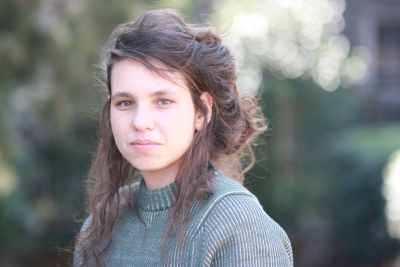Yam Maayan, 2023-24 HOPE Center Visiting Scholar

A recipient of the Nobel Prize in economics, Kenneth Arrow had a long career—he died in 2017, at age 95—making contributions in a number of areas, any one of which would have earned him an enduring and exalted place in the history of the discipline.
It is no surprise, then, that Yam Maayan, a 2023-24 HOPE Center Visiting Scholar, finds Arrow such a fascinating subject on which to write.
“General equilibrium theory, social choice theory, information economics—Arrow was one of those old-style economists who came of age around World War II who branched out into so many vital areas,” Yam says.
Currently, Yam is focusing on the way in which Arrow bridged his abstract mathematical work with his intense interest in practical policy questions.
“I’m fascinated by the way he overcomes the gap between his abstract models and hands-on policy analysis,” says Yam, a PhD student at Tel Aviv University in her native Israel. “He’s good at explaining what he’s doing, too, which makes him fun to read and study.”
As Yam explains, Arrow was also both critical of and a defender of important elements in the mainstream of the discipline. For instance, he was an advocate of cost-benefit analysis, yet cautioned against hasty attempts to use data to put a value on something as complex as human life.
“In general, it is clear that he was open-minded and open to discussion with researchers from other fields, but at the same time, I think that he thought that mathematical economics was the best way to deal with complicated policy problems.”
While at Duke, Yam is looking through Arrow’s papers, which are in the Rubenstein Library.
“It’s nice when I come across a letter or other item in the archives that supports an intuition I have about Arrow,” Yam says, mentioning a letter from Arrow to Leonid Hurwicz in which Arrow writes that the key issue is not how an economy reaches stability but whether equilibrium is even possible in the first place.
Yam recently completed her dissertation, in which she examined, among other things, the distinction between choices and preferences.
“Arrow, of course, had much to say about that. Whereas a Milton Friedman believed that a choice was simply the exercise of free will, Arrow said that the economic system in which a choice is made matters too—free will alone is not enough.”
When asked to describe Arrow in one word, Yam says, “Annoying. Just kidding. Everyone who knew him said he was the smartest man they knew. And the nicest.”
Yam, who is here with her spouse, who is a poet, and daughter, says that when she began studying economics, she had no knowledge of its history. “I didn’t know that I was being taught what’s considered neoclassical economics and that that economics emerged from a particular historical context. It was only after I started reading about the history of economics and incorporating the history of the discipline in my courses did I start to gain a useful perspective on the subject.”
This is Yam’s first visit to the United States. She says that the wide open spaces here are impressive. “Israel is very small—you can drive from one end of the country to the other in five or six hours. Here, you can drive five or six hours and still be in North Carolina.”
Walking, however . . . “Well, that’s a different matter. In some places, there are no sidewalks!”
Yam and her family will return to Israel in April.